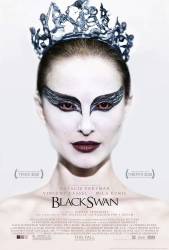Thomas Leroy: The new production needs a new swan queen. A fresh face to present to the world. But which of you can embody both swans? The white and the black?
Beth Macintyre: Perfect? I'm not perfect. I'm nothing.
Thomas Leroy: Thank you, Nina! It's very nice. It's very nice, but I knew the white swan wouldn't be your problem. The real work would be your metamorphosis into her evil twin. I know I saw a flash of her yesterday, so get ready to give me more of that bite.
Thomas Leroy: I got a little homework assignment for you. Go home and touch yourself. Live a little.
Lily: Did you have some sort of lezzie wet dream about me? Was I good?
Thomas Leroy: That was me seducing you. It needs to be the other way around.
Thomas Leroy: The only person standing in your way is you.
Nina: I just want to be perfect.
Erica: What happened to my sweet girl?
Nina: She's gone!






Answer: **Spoiler Alert** I would say you are correct about the movie being a metaphor for descent into madness, but also displays themes of repressed sexuality and transformation. As the main character is given the lead role, she must play dual roles, one good and one evil, with the hallucinations representing the latter. Towards the beginning, Nina only embodies the personality traits of the white swan, innocence and grace. As the film gradually progresses, Ninas hallucinations represent her metamorphosis into the seductive and mysterious black swan. The film expertly convinces the audience that Lily (Mila Kunis) is out for Nina's role. In a twist ending, it is revealed that Nina has imagined most of her encounters with lily (including their sexual one) and has instead been battling herself, such as breaking away from her domineering mother and coming to terms with her sexuality. At the end, Nina really does stab herself (but actually hallucinates it is Lily she is stabbing) and her fate is left ambiguous.